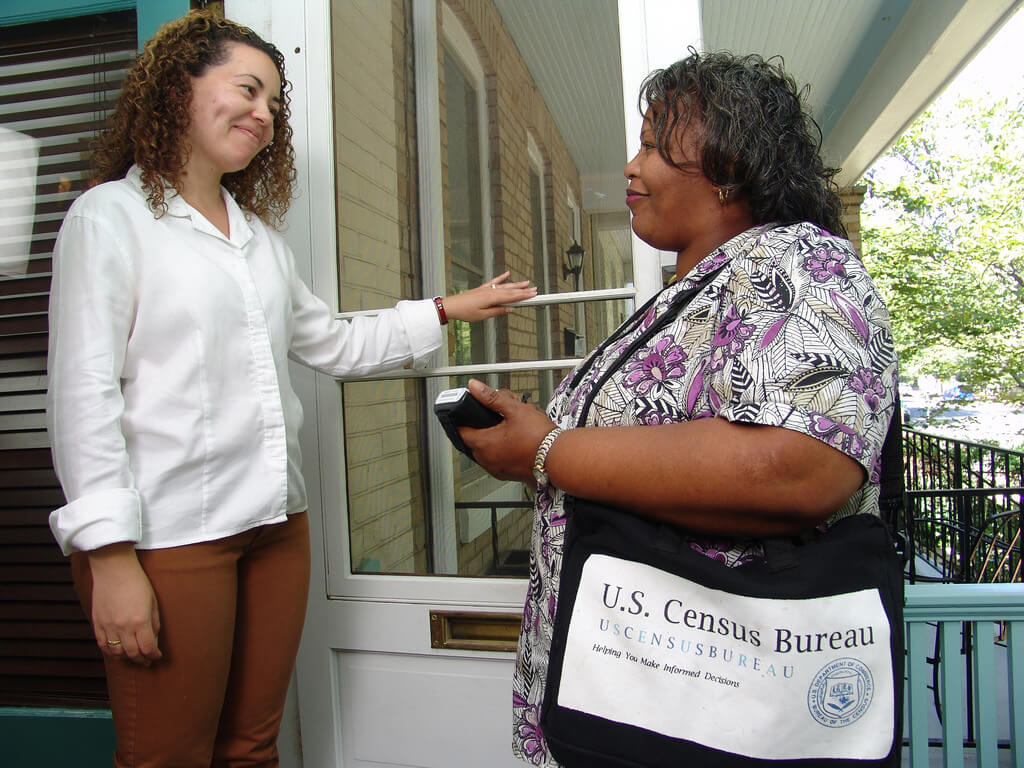by Jacob Model
The Recruiting Need of the Census
Sourcing and recruiting high-quality field staff is a strategic way to use precious grant dollars to ensure an accurate count. Door-to-door enumeration will account for up to 40 percent of America’s households in the 2020 Census, nearly 50 percent more than in 2010.
The Census needs to hire, train and deploy nearly half a million enumerators — about the same number as the entire US retail sector hires during the holiday season — to knock on doors across the country.
The Census Bureau is asking local nonprofits and community-based organizations for help in sourcing those candidates, especially from hard-to-count areas.
What’s at Stake
A low response rate to door-to-door enumeration will force the Census to rely more heavily on alternative methods of enumeration, such as count imputation. These methods yield less accurate results and have been shown to undercount vulnerable populations, like children.
Census data determines political representation at all levels of government, redistricting, and how much federal funding your community receives. For every person undercounted, communities risk losing thousands of dollars in funding to essential programs like Head Start and SNAP every year for the next ten years.
How Hard-to-Count Community Members Benefit
The enumerator job is a great work opportunity to earn supplemental income or advance one’s career. The job pays well ($12 – $30 an hour), has flexible hours, and builds customer service skills as well as technological literacy. After the census ends, enumerators may be eligible for dislocated worker benefits, including college tuition assistance.
Where Funders and Nonprofits Can Have Impact
(1) Sourcing Local Candidates
Nonprofits are deeply embedded within hard-to-count communities and therefore well-positioned to serve as the liaison between potential candidates and the Census. Recruiting local enumerators is crucial because residents are more likely to answer the door when the person knocking is from the neighborhood, and residents are more likely to answer accurately when enumerators can communicate with them in their preferred language.
(2) Building a Robust Pipeline of Candidates
The Census Bureau expects that for every five candidates who apply, only one will be deployed in the field. This attrition is largely caused by the two-month (or longer) waiting period between when candidates first apply and when the Census trains them.
Nonprofits can help source the massive supply of candidates needed to compensate for this attrition. They can also create volunteer and paid opportunities, like neighborhood canvassing, to keep candidates motivated and engaged while they wait.
(3) Supporting Candidates:
Provide Access to Computers and Coaching in Application Process
Unlike previous censuses, the enumerator application is being offered primarily online. This will deter high-quality candidates from hard-to-count communities who lack digital literacy or access to a computer from applying. Nonprofits — especially civic engagement and workforce development organizations who already shepherd clients through other application processes — can provide the following support to overcome these hurdles:
- Provide computers and broadband Internet access to interested candidates
- Help candidates gather, digitize, and upload the documentation required in the application.
- Prepare candidates for the required online assessment
- Remind candidates to complete their applications
(4) Help Candidates Check and Clear Backgrounds
Nonprofits can also help candidates check and clear their records for the federal background check required by the application. This proved a significant barrier for minority candidates in prior censuses.
Partnership Opportunities for Companies & Colleges:
To increase the attractiveness of the job for applicants who see enumeration as a career stepping stone, community colleges and private sector employers can build bridges between this short-term work and longer-term skill development and employment.
Several organizations are interested in mapping the skills and competencies learned as an enumerator — e.g., sales ability, team coordination, digital literacy — to community college credits. Incentives like these appeal to younger pools of talent and help make the case for taking an enumerator job in lieu of a different role with less opportunity for career progression.
The Final Count

Hiring the right number and kind of enumerators is more critical now than it has been for any prior census. The substantial networks of nonprofits and funders can be utilized to source high-quality, local candidates who will improve the accuracy of the enumeration in hard-to-count communities, ensuring they have the resources and representation they deserve.
Jacob Model, PhD is VP of Data & Research at CommunityConnect Labs. He developed the first Community-Based Address Canvassing tool for the Local Update of Census Addresses (LUCA) phase of the 2020 Census, used by over 6 local governments and 40 community-based organizations. He is a frequent and consultant speaker on strategies to address the potential Census undercount.

